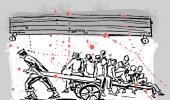The lockdown should have been used to drum into Indians' head the reasons for social distancing and the necessity for it, and the costs of not applying it in our daily lives and it should have been used to set up the systems that would manage large numbers of infected, observes Mihir S Sharma.

When fighting the coronavirus pandemic, any definition of 'success' short of the discovery and swift worldwide delivery of a vaccine was always going to be problematic.
This is something that too few governments across the world were willing to admit from the beginning.
Prime Minister Narendra Modi, for example, in his earliest speech on the subject in March, when he announced the first lockdown, said that 'the Mahabharata was won in 18 days, but the COVID-19 battle will take 21'.
But, even then, we should have known this was not true, and the battle would take much longer than that.
Victory in terms of controlling the spread of the disease would require a complete lockdown, as stringent as the one India thought it was imposing, more stringent than what the Indian state was in fact capable of implementing.
The Wuhan lockdown that managed the disease's spread in the city of its origin basically locked the city up in its own homes for weeks, with people in full-body suits monitoring their compliance.
This was never possible in India.
Our State is weak enough that we needed at least basic co-operation from our own people -- but the sight of thousands of migrants on the roads trying to get back home just days after the prime minister spoke revealed that this co-operation was not going to be available from those who felt desperate and abandoned economically.
Frankly, we should have accepted right then that the lockdown would not succeed in its stated initial purpose of controlling the geographic spread of the virus.
Perhaps it nevertheless helped in managing the epidemic's exponential growth.
But here we run into the second problem: In this case, success breeds contempt.
Suppose for a moment that the lockdown did indeed succeed in as much as that, for a while, doubling times slowly increased.
That moderate success gave birth to multiple other theories.
First, that Indians were somehow relatively immune.
Second, that the virus spread less in heat and humidity. And so on. Any of these may be more or less true.
But the fact is that the primary reason the curve did not become exponential was that India was in lockdown.
Worst of all, the fact that the curve did not appear to become exponential bred over-confidence.
People wondered why larger numbers of Indians were not dying.
Others asked why, now that we had done all the work of preventing the curve from going exponential, we were not opening up.
Yet others asked if the lockdown had been really necessary.
In other words, everyone simply forgot that the epidemic had not yet been as bad as it could be precisely because of the early and harsh lockdown.
And so we have seen, across the country, an uncalibrated and overconfident re-opening.
Unlike many other parts of the world, such as East Asia or Europe, where the re-opening of the economy has usually accompanied a dip in their infection curve, India re-opened while its curve was still steeply increasing.
There was zero public health logic applied. Zero.
Naturally now, in various states across the country, medical facilities are rapidly running out of resources.
Let us set some ideas at rest, first.
Just because we are a poorer country than many others does not mean that we can somehow afford to lose the vast number of people who will be killed if the virus sweeps uncontrolled across our population.
We are also a country with a poorer health system than many others, so we have to accept in addition that our death rate will be higher.
Some work by the Centre for Policy Research's Partha Mukhopadhyay published recently in the Hindustan Times argues that India's mortality rate is in fact among the highest in the world: 'Instead of being among the lowest, India's age-adjusted death rate is actually higher than Italy's'.
Mukhopadhyay concedes we do not know why this is the case: 'Is it because our hospital system is not equipped for managing... Covid? Or because we lack facilities like oxygen support, etc.? Or because our immune system is compromised by lack of nourishment and bad water and air, or because of numerous comorbidities?'
These are all good questions, but they are a reminder that we are likely more, not less vulnerable to the virus.
An economy that loses elements because it operates for months, with social distancing, at 10 to 20 per cent below its potential will hurt many Indians.
But an economy ravaged by millions dying will not look much better.
Remember that, in the 1918 influenza epidemic, 12 million to 17 million Indians died, of a much smaller population.
And remember also that it was the second wave that killed -- in the fall and early winter.
The lockdown should have been used to drum into Indians' head the reasons for social distancing and the necessity for it, and the costs of not applying it in our daily lives.
And it should have been used to set up the systems that would manage large numbers of infected.
Neither of those was really achieved.
By that definition, it was definitely not a success.
Production: Aslam Hunani/Rediff.com











